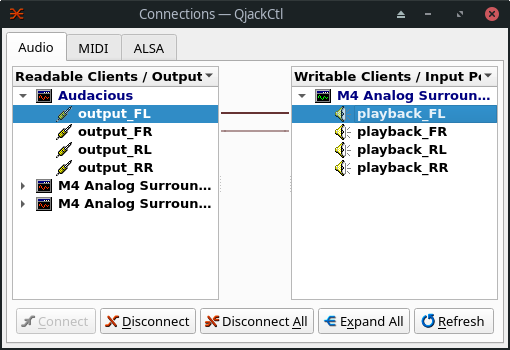My built-in speakers are detected but no sound comes out. When I play audio the little bar showing volume is going up and down, but no sound comes out. Even in a liveboot no sound comes out. I’m dualbooting Windows but I’m not sure this is the problem since even in liveboot I have no sound. (Sound works in Windows 10 though).
HDMI sound was working though.
inxi -Fazy:
System:
Kernel: 5.15.12-1-MANJARO x86_64 bits: 64 compiler: gcc v: 11.1.0
parameters: BOOT_IMAGE=/boot/vmlinuz-x86_64 lang=en_US keytable=us tz=UTC
misobasedir=manjaro misolabel=MANJARO_KDE_2121 quiet systemd.show_status=1
apparmor=1 security=apparmor driver=nonfree nouveau.modeset=0
i915.modeset=1 radeon.modeset=1
Desktop: KDE Plasma 5.23.4 tk: Qt 5.15.2 wm: kwin_x11 vt: 1 dm: SDDM
Distro: Manjaro Linux base: Arch Linux
Machine:
Type: Convertible System: HP product: HP Pavilion x360 Convertible 14-ba1xx
v: Type1ProductConfigId serial: <superuser required> Chassis: type: 31
serial: <superuser required>
Mobo: HP model: 83C4 v: 31.61 serial: <superuser required> UEFI: Insyde
v: F.53 date: 05/16/2019
Battery:
ID-1: BAT0 charge: 21.1 Wh (100.0%) condition: 21.1/21.1 Wh (100.0%)
volts: 12.8 min: 11.6 model: 333-54-5D-A BK03041XL type: Li-ion
serial: <filter> status: Full
Device-1: hid-0018:04F3:251C.0002-battery model: ELAN0732:00 04F3:251C
serial: N/A charge: N/A status: N/A
CPU:
Info: model: Intel Core i5-8250U bits: 64 type: MT MCP arch: Coffee Lake
family: 6 model-id: 0x8E (142) stepping: 0xA (10) microcode: 0xEA
Topology: cpus: 1x cores: 4 tpc: 2 threads: 8 smt: enabled cache:
L1: 256 KiB desc: d-4x32 KiB; i-4x32 KiB L2: 1024 KiB desc: 4x256 KiB
L3: 6 MiB desc: 1x6 MiB
Speed (MHz): avg: 900 high: 901 min/max: 400/3400 scaling:
driver: intel_pstate governor: powersave cores: 1: 900 2: 901 3: 900 4: 900
5: 900 6: 900 7: 900 8: 900 bogomips: 28808
Flags: avx avx2 ht lm nx pae sse sse2 sse3 sse4_1 sse4_2 ssse3 vmx
Vulnerabilities:
Type: itlb_multihit status: KVM: VMX disabled
Type: l1tf
mitigation: PTE Inversion; VMX: conditional cache flushes, SMT vulnerable
Type: mds mitigation: Clear CPU buffers; SMT vulnerable
Type: meltdown mitigation: PTI
Type: spec_store_bypass
mitigation: Speculative Store Bypass disabled via prctl and seccomp
Type: spectre_v1
mitigation: usercopy/swapgs barriers and __user pointer sanitization
Type: spectre_v2 mitigation: Full generic retpoline, IBPB: conditional,
IBRS_FW, STIBP: conditional, RSB filling
Type: srbds mitigation: Microcode
Type: tsx_async_abort status: Not affected
Graphics:
Device-1: Intel UHD Graphics 620 vendor: Hewlett-Packard driver: i915
v: kernel bus-ID: 00:02.0 chip-ID: 8086:5917 class-ID: 0300
Device-2: Chicony HP Wide Vision HD Camera type: USB driver: uvcvideo
bus-ID: 1-4:4 chip-ID: 04f2:b5d6 class-ID: 0e02
Display: x11 server: X.org 1.21.1.2 compositor: kwin_x11 driver:
loaded: modesetting alternate: fbdev,vesa resolution: <missing: xdpyinfo>
Message: Unable to show advanced data. Required tool glxinfo missing.
Audio:
Device-1: Intel Sunrise Point-LP HD Audio vendor: Hewlett-Packard
driver: snd_hda_intel v: kernel alternate: snd_soc_skl bus-ID: 00:1f.3
chip-ID: 8086:9d71 class-ID: 0403
Sound Server-1: ALSA v: k5.15.12-1-MANJARO running: yes
Sound Server-2: JACK v: 1.9.19 running: no
Sound Server-3: PulseAudio v: 15.0 running: yes
Sound Server-4: PipeWire v: 0.3.42 running: yes
Network:
Device-1: Intel Dual Band Wireless-AC 3168NGW [Stone Peak] driver: iwlwifi
v: kernel bus-ID: 02:00.0 chip-ID: 8086:24fb class-ID: 0280
IF: wlo1 state: up mac: <filter>
Bluetooth:
Device-1: Intel Wireless-AC 3168 Bluetooth type: USB driver: btusb v: 0.8
bus-ID: 1-5:5 chip-ID: 8087:0aa7 class-ID: e001
Report: rfkill ID: hci0 rfk-id: 0 state: up address: see --recommends
Drives:
Local Storage: total: 961.33 GiB used: 0 KiB (0.0%)
SMART Message: Unable to run smartctl. Root privileges required.
ID-1: /dev/sda maj-min: 8:0 vendor: Toshiba model: MQ04ABF100
size: 931.51 GiB block-size: physical: 4096 B logical: 512 B speed: 6.0 Gb/s
type: HDD rpm: 5400 serial: <filter> rev: 1C scheme: GPT
ID-2: /dev/sdb maj-min: 8:16 type: USB vendor: Lexar
model: USB Flash Drive size: 29.82 GiB block-size: physical: 512 B
logical: 512 B type: SSD serial: <filter> rev: 1100 scheme: MBR
SMART Message: Unknown USB bridge. Flash drive/Unsupported enclosure?
Partition:
Message: No partition data found.
Swap:
Alert: No swap data was found.
Sensors:
System Temperatures: cpu: 38.0 C pch: 33.5 C mobo: 33.0 C
Fan Speeds (RPM): N/A
Info:
Processes: 250 Uptime: 4m wakeups: 3 Memory: 15.5 GiB used: 2.5 GiB (16.1%)
Init: systemd v: 250 tool: systemctl Compilers: gcc: N/A Packages:
pacman: 1228 lib: 331 flatpak: 0 Shell: Zsh v: 5.8 default: Bash v: 5.1.12
running-in: konsole inxi: 3.3.11
